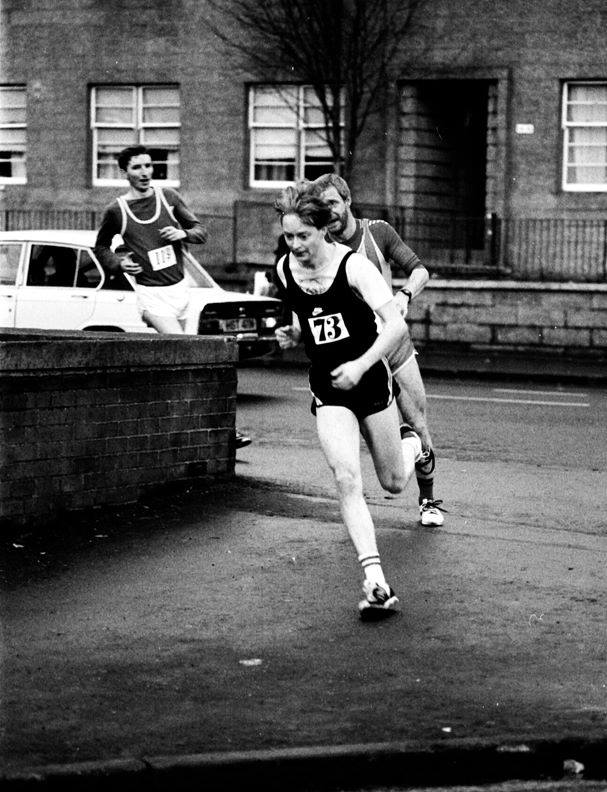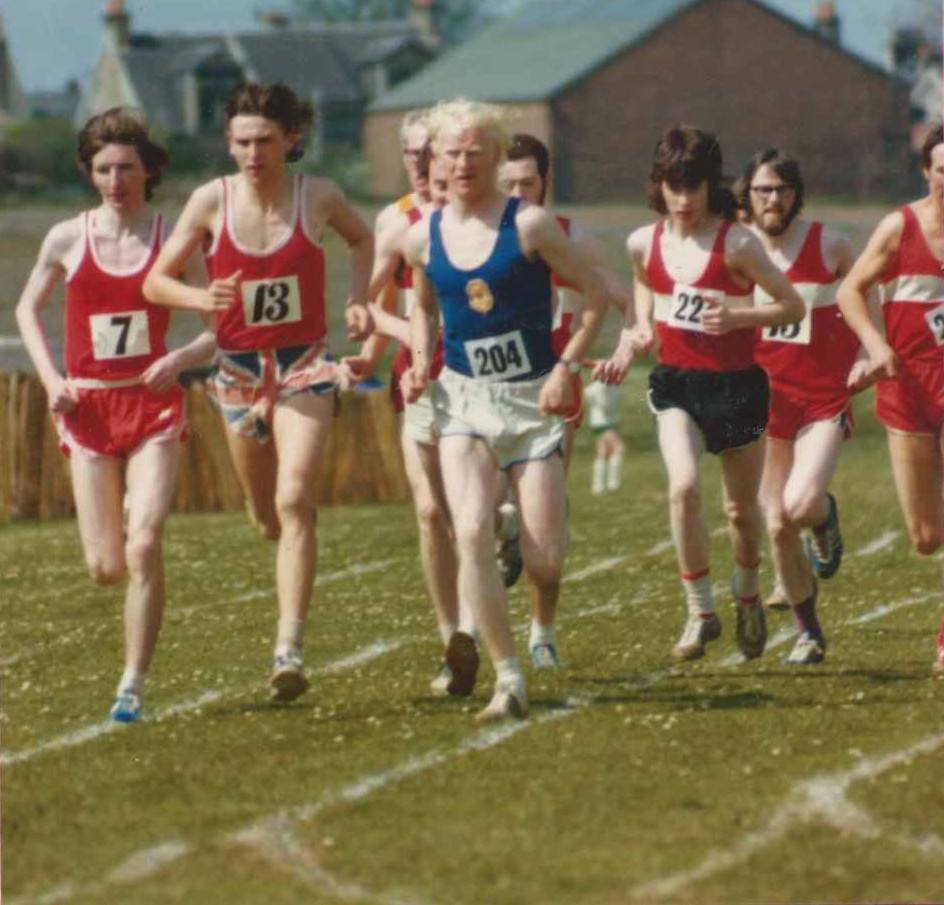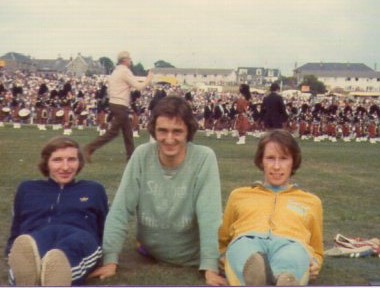Joe Small running third in this picture at the finish of the Nigel Barge Road Race
Scottish distance running in the 70’s 80’s and early 90’s was on a real high and road racing was experiencing the ‘running boom’. If you look at the Scottish athletics who’s who on this site it will be clear that there were many competing who were regarded as club runners but whose performances in, for example, the marathon and the various stages of the Edinburgh to Glasgow relay, would have won honours in previous generations. One of these was Joe Small and we can begin to examine his athletics career by looking at his answers to the questionnaire.
Name: Joe Small
Club/s: Monkland Harriers, Clyde Valley AAC, Cambuslang Harriers
Date of Birth: 28/12/54
Occupation: Retired Curtain Wall Designer
How did you get into the sport initially: Started at secondary school, running in local cross country races then joined Monkland Harriers.
Personal Bests: 3000m 8.46, 5000m 15.14, 3000m S/C 9.58, Marathon 2.25.43
Has any individual or group had a marked effect on either your attitude to the sport or your performances? The guys at St. Pat’s & Monkland Harriers in Coatbridge – Ronnie MacDonald, Jim Brown, Paul Bannon, Eddie Devlin, Willie Drysdale, Andy Arbuckle, Tom Callaghan etc. – a long list!
What exactly did you get out of the sport? Sense of achievement, cameraderie with clubmates, competing all over the country.
What do you consider your best ever performance? Not a single race, but a month,
April 25th, 1981; Clydebank-Helensburgh: 3rd, Edinburgh-North.Berwick: 4th, Lanarkshire 10: 3rd, Strathkelvin 12: 4th, Airdrie 13: 2nd. Didn’t repeat that again!
And your worst? Running in 3rd team for Cambuslang in District X/C relay – struggling, being passed by guys I didn’t know, back hurting – my last ever race.
What goals did you have that were never achieved? A fast marathon. Never really recorded the times that I felt training & shorter races indicated I should have been able to achieve.
What has running brought you that you would not have wanted to miss? General sense of fitness, meeting lots of different people & seeing places I would probably not otherwise have visited.
Can you give some details of your training? Typical week:
Sunday: Long steady run, 10-15 miles.
Monday: 8-10 miles steady
Tuesday: Fast 10 miler, usually with guys at club.
Wednesday: Faster work, track 10 x 400, or fartlek session
Thursday: 6 miles at club.
Friday: Easy 5 miles, or 3 if racing next day.
Saturday: Race or steady run, 8-10 miles.
The answers above are interesting. If we start at the end we see that although he was running well at a time when many, if not most, road racers were doing 100 mpw (or as near that figure as their body would let them) he was doing a much lower total: somewhere between about 45 and 60 miles a week. For a man running marathon, Joe’s long run was only 15 miles. In fairness, he does also say that in the build up to the marathon he it would be 70-75 mpw with a long run of about 20 miles. But on the other hand, the quality was high – given the quality of men in the club, a fast 10 on a Tuesday would be maybe racing pace for many. For a man who never ran a fast marathon, his best three years were 1979, 1980 and 1981 with times of 2:30:01, 2:25:57 and 2:25:43. His best time would have won all but one of the SAAA marathon championships between 1946 and 1962. That he was a good runner is not in doubt. The results of his ‘good month’ mentioned above show that in some detail and are worth looking at.
| RACE | DISTANCE | FIRST | SECOND | THIRD | COMMENTS |
| Clydebank – Helensburgh | 16 Miles | T Wiseman 1:26:09 | * *E Cameron 1:26:17 | J Small 1:26:45 | |
| Edinburgh – North Berwick | 21.8 Miles | + 1st **D Macgregor
2nd *R Stone 1:52:53 |
3. E Cameron 1:54:06 | 4. J Small 1:55:36 | Macgregor Olympian |
| Lanarkshire | 10 Miles | *D Frame 52:30 | *D Gunstone 52:58 | J Small 53:00 | |
| Strathkelvin | 12 Miles | **T Mitchell 65:16 | **A Macfarlane 66:13 | A Coutts 66:31 | 4. J Small 66:58 |
| Airdrie | 13 Miles | *A Keith 63:38 | J Small 63:57 | H Gorman 65:58 |
Joe Small ran in the race twice – the first time was in 1978 and he says – This was my first attempt at a long race. Having decided to try the marathon and only having raced 12 to 15 miles, I thought that the 21.8 miles would be a good stepping stone. Starting from Meadowbank Stadium I sat in the leading pack gradually moving up as others fell off the pace. The group held fairly tightly together as there was a fairly strong headwind until around the ten mile mark when it was whittled down to three – myself, Davie Wyper and Jim Russell. I pushed the pace from there and Jim was quickly dropped leaving me to do all the work as Davie sat in. I tried everything to get clear – speeding up, slowing down, even inviting him to go in front but he didn’t take up the offer! We came into North Berwick, still together and previous knowledge (he’d won the race two years before) allowed him to sprint clear. I hadn’t a clue where the finish was! Dave beat me by 6 seconds with 2:01:50 but I was quite pleased with my first effort at the distance. A couple of years later, in better conditions, I had a really fast run – 1:55 – to finish fifth I think.
Let’s have a look at Joe’s performances in the classic winter events – the district and national championships as well as the classic Edinburgh to Glasgow relay race. Take the November event, E – G, as the first of these held every winter.
Like all good road runners, and all good club men, Joe did his work in the toughest road relay in the country – the classic eight stage Edinburgh to Glasgow relay. He ran in ten of them, for two clubs (Monkland and Clyde Valley), covered stages 1, 4, 5, 6, 7 and 8 at various times and was part of teams that won the race (1980) and had three third places (1974, 1975, and 1983). His team mates in the 1980 winning team were Ronnie McDonald, Neil Agnew, Ian Gilmour, Jim Brown, John Graham, Eddie Devlin and Peter Fox. Selection was tough in most of the Clyde Valley years and just making the team was a feat in itself. Joe, like Eddie Devlin, was a key part of these teams and the Browns, McDonalds, Gilmours and Grahams would not have won as many team medals without them. The same is true of the county, district and national cross-country championships. The National six-stage road relay did not appear on the fixture list until season 1978/79 and Clyde Valley only took part in the first three. Joe ran on the first stage in the inaugural event finishing fifth of 44 runners, only 20 seconds behind the leader and putting his team well in contention. They finished second that day. The following year he was third fastest on the opening stage for the Clyde Valley team that finished second. The year after that (1981) he ran on the second stage for the team that finished fifth. Again running well, beating several men who on paper should have been ahead of him and helping win medals for his team mates.
The Midland Championships are next of the big championships on the calendar and Joe first appeared there as a senior boy in 1970 when he finished 34th but as a non-scorer in the Monklands team that finished sixth. He went on to run as a Youth (ie under 17) twice with a best position of seventh in 1972. He then ran in the combined Junior/Senior championship where he was almost always a counting runner in the six man team for Monkland and then for Clyde Valley from 1975. Joe continued to progress as he went through the age groups and started to train with the big boys – and the big boys in Monkland and Clyde Valley were very big indeed. Jim Brown and Ronnie McDonald were from the Monkland days, and if we add in Brian McSloy, John Graham, Ian Gilmour and Peter Fox then you have runners that could take on the very best at any distance from 1500m to marathon. The same is true of the National Championships; Clyde Valley teams won many races as teams of individuals or as relay teams whether it was at County, District or National level. It is equally true that the big boys would not have won anywhere near as many races, trophies or medals without Joe, or Eddie or Neil. He was in the winning team at the National championship in 1973 as a Junior Man and in 1980 with a Clyde Valley team, second in 1982 and third in 1981 also with Clyde Valley.
Joe Small on the extreme left running in the Lanarkshire Championships
Joe was undeniably a very good athlete as far as road and cross-country running was concerned, although he did run on the track and was even ranked in Scotland as a steeplechaser but, by and large, his track best times as noted above are not as impressive as the other chievements already noted. When we asked him about it he replied, “Regarding track, I would say that I was a road runner first, cross country second with track a distant third. The steeplechasing followed on from school, couldn’t compete with the guys on the flat so tried the hurdles instead. After finishing 3rd in the Scottish Schools 2000m I tried a couple 3000m’s before packing it in.” There is however inter-club competition on the track as well as over the country or on the road. One of the things the endurance athlete did during the summer was compete in track team races – usually four to run but only three to score- and there were many of these across the land. Lanarkshire had its fair share of these with the nearest to Joe being at Shotts, Airdrie and Coatbridge. The tracks varied in distance and in degree of upkeep allocated to the track surface. A good clubman, Joe competed in them for the team. His comments of the highland games circuit? “Favourite event would probably be Cowal, as a club we’d usually get an invite to the 3000m team race (with all expenses paid!), so travel down, run the race then spend the expenses on beer! I was never a fan of handicap races at highland games, I always thought you should compete on level terms, if you couldn’t keep up so be it, so tended to do 3000 team races.” I think everybody liked Cowal. The journey to Dunoon was enjoyable, the crowd was massive, it was the last Saturday before the football season started which helped, and it had the added attraction of the March of a Thousand Pipers at the end as they appeared between the houses high up at the corner of the arena and marched down and into the arena – band after band after band with the different kilts on display. The track was not as good as some but it was 440 yards which was unusual. Joe’s final comment was,” No national or even district results to speak of on the track, just a lack of speed really, although I did run in the Home Countries Schools International (2000m s/chase)”
That then is Joe’s career as a distance runner of some ability, a man who would have been welcome in any club in the land for his ability and and his team spirit.
Enjoying Cowal: Joe, Ian Moncur and Neil Agnew


